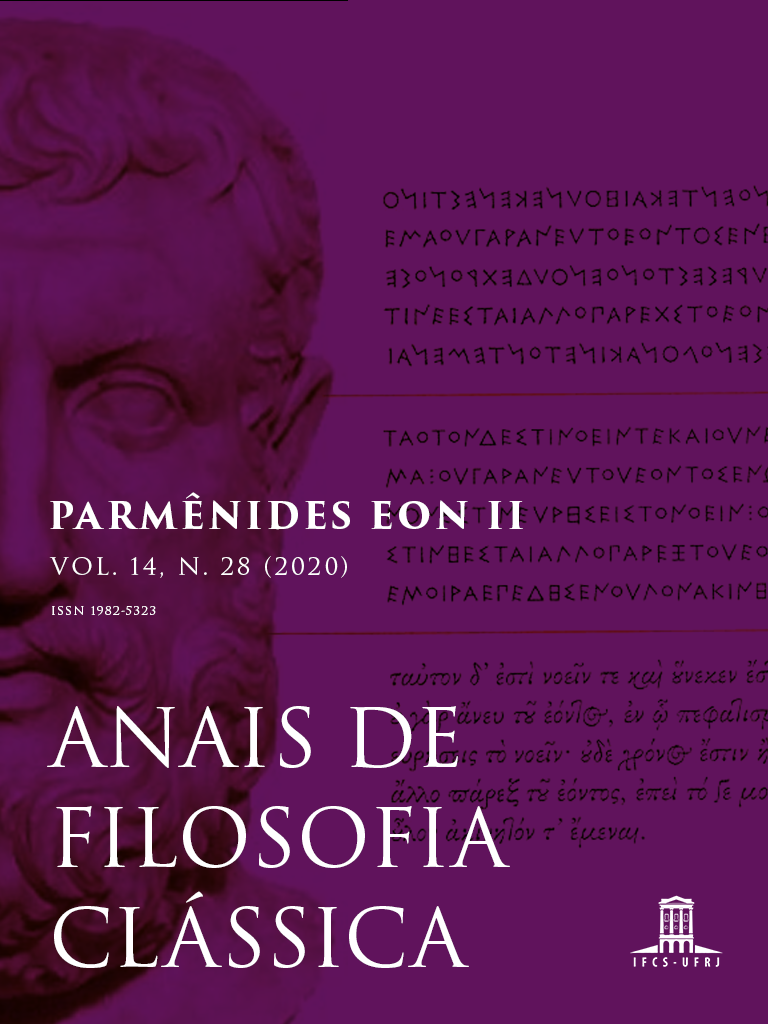Non-being in Parmenides, DK B2
DOI :
https://doi.org/10.47661/afcl.v14i28.41661Mots-clés :
Parmenides, Non-being, Non-contradiction, Eleaticism, ParricideRésumé
In fragment DK 28 B 2 of his poem, Parmenides presents his method for distinguishing true persuasion from the lack of true persuasion. The famous two ways for thought that he suggests are the enunciation of a complex system which aims to assure the assertions’ truthfulness and finally a credible discourse, the only one capable of real persuasion. The present article tries to show the central role attributed to non-being in the Parmenidean argumentation. The entire fragment is interpreted from this central notion, surely attained by a reflection on the impossibility of negating being, shedding light on Parmenides’ discovery of that impossibility, which we currently call “contradiction”. He enunciates that the way to avoid contradiction in thought and discourse is through a rule that we call a principle of non-contradiction. The study featured here makes a detailed inquiry into the notion of non-being in fr. 2, finally offering a new translation.
Références
Barnes, J. The presocratic philosophers. (London: Routledge, 1982).
Bonifazi, A., Drummen, A., de Kreij, M., Particles in Ancient Greek Discourse: Exploring Particle Use across Genres. (Hellenic Studies Series 79. Washington, DC: Center for Hellenic Studies, 2016).
http://chs.harvard.edu/CHS/article/display/6391
Cordero, N.L. La déesse de Parménide, maitresse de philosophie. In: Mattéi, J.F. (Ed.). La naissance de la raison en Grèce. (Paris: P.U.F., 1990) p. 207-214.
______. By being, it is. The thesis of Parmenides (Las Vegas: Parmenides Publishing, 2004).
Coxon, A.H. The fragments of Parmenides. Revised and expanded edition. (Las Vegas: Parmenides Publishing, 2009).
Curd, P. The Legacy of Parmenides. (Las Vegas: Parmenides Publishing, 2004).
Denniston, J.D. The greek particle. (Oxford: OUP, 1954, 2nd ed.).
Galgano, N.S. A transgressão de Melisso. 2010. 180 f. Dissertação (Mestrado em Filosofia) - FFLCH-USP, São Paulo, 2010.
______. “A verdade tem um coração intrépido?” in Una mirada actual a filosofia griega, Madrid: SIFG, 2012.
______. “Amēkhaníē in Parmenides DK 28 B 6.5” Journal of Ancient Philosophy v. 10, n. 2, (2016) p.1-12.
______. “Parmenides as psychologist – part I: fragments DK 1 and 2” Archai, n. 19, (2017a) p. 167-205,.
______. “Parmenides as psychologist – part II: fragments DK 6 and 7” Archai, n. 20, (2017b) p. 39-76, 2017b.
______. I precetti della dea. Non essere e contraddizione in Parmenide di Elea (Bologna: Diogenes Multimedia, 2017c).
______. Parmenides: o não ser como contradição (São Paulo: Paulus, 2019).
Gallop, D. Parmenides of Elea: fragments (Toronto: University of Toronto Press, 1984).
Humbert, J. Syntaxe greque (Paris: Klincksieck, 1954, 2nd ed.).
Kahn, C.H. The verb ‘be’ in ancient greek (Indianapolis: Hackett Publishing, 2003, 2nd ed.).
______. Essays on Being. (Oxford: OUP, 2009).
Kurfess, C. Restoring Parmenides’ poem: essays toward a new arrangement of the fragments based on a reassessment of the original sources. 2012 (Diss., University of Pittsburg, Pittsburg, 2012).
Lesher, J.H. Xenophanes of Colophon (Toronto: University of Toronto Press, 2001).
Levet, J. Le vrai et le faux dans la pensée grequem archaïque – Étude de vocabulaire. Tome 1 (Paris: Les Belles Lettres, 1976).
Mansfeld, J. Die Offenbarung des Parmenideliche Welt (Assen: Van Gorcum, 1964).
Meijer, P.A. Parmenides beyond the gates (Amsterdam: J. C. Gieben, 1997).
Mourelatos, A.P.D. The route of Parmenides. Revised and expanded edition (Las Vegas: Parmenides Publishing, 2008).
Rossetti, L. “La structure du poéme de Parménide” Philosophie Antique, Paris, n. 10, (2010) p. 187-226.
______. “L’ideazione del pinax, “medial innovation” di Anassimandro,” in Leão, D., Cornelli, G., Peixoto, M.C. (eds.). Dos homens e suas ideias: estudos sobre as Vidas de Diógenes Laércio. (Coimbra: Imprensa da Universidade de Coimbra, 2013) p. 89-100.
Smyth, H.W. Greek grammar (Cambridge: Harvard University Press, 1956).
Tarán, L. Parmenides. (Princeton: Princeton University Press, 1965).


